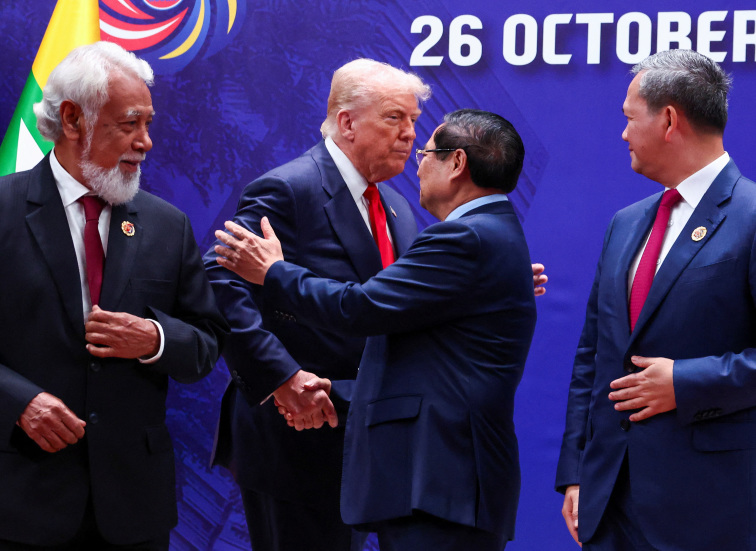On June 24, 2024, a Japanese mother and child were attacked and injured by a man at a bus stop in Suzhou. A Chinese woman, Hu Youping, stepped in to stop the assailant, was severely wounded, and sadly passed away. The Japanese Embassy in China issued a statement honouring Hu Youping’s noble act and flew its flag at half-mast in mourning. (Composite screenshot)
[People News] As comments made recently by Japan’s new Prime Minister Sanae Takaichi regarding Taiwan triggered a diplomatic dispute with the Chinese Communist regime and pushed bilateral relations to a highly tense state, the Japanese Embassy in China has urged Japanese nationals in China to remain vigilant, strengthen personal safety measures, and avoid crowded areas and other locations frequently visited by Japanese people.
According to a Voice of America report, Takaichi’s recent remarks—that Japan might intervene militarily if the CCP takes action to seize Taiwan—have sparked one of the most severe diplomatic clashes between Japan and China in recent years.
Amid strained relations, and particularly in light of CCP state media coverage of the issue, the Japanese Embassy in China posted a notice in Japanese on its official website on Monday (Nov. 17), reminding Japanese citizens in China to take safety precautions.
The notice said: “When going out, be sure to remain vigilant, stay aware of your surroundings, watch out for suspicious individuals, and try to travel in groups to ensure safety. If you are traveling with children, please take extra care.”
The notice also advised Japanese nationals to respect local customs, be mindful of their words and actions when interacting with Chinese people, remain aware of their environment, and avoid crowded public places and areas frequently visited by Japanese.
It said: “If you discover suspicious individuals or groups, do not approach—leave immediately.”
On November 7, Sanae Takaichi broke with Japan’s longstanding practice of avoiding explicit reference to Taiwan in the context of a “Situation Threatening Japan’s Survival.” She stated during a Diet session that if China deployed warships and used military force in an attempt to blockade or seize Taiwan, “this could constitute a Situation Threatening Japan’s Survival,” and under Japanese law, such a situation would allow Japan to deploy its military.
Beijing reacted strongly to the Japanese prime minister’s comments. CCP state media launched successive attacks on Japan. Xue Jian, the CCP’s Consul General in Osaka, posted in Japanese on the social media platform X, implying a threat to “behead” the Japanese prime minister.
The CCP also sent warships to patrol disputed waters between the two countries and announced live-fire drills from Nov. 17 to 19 in parts of the central Yellow Sea near Japan. At the same time, the CCP escalated economic pressure, urging Chinese tourists to avoid traveling to Japan for the time being. China is Japan’s largest trading partner and also one of its biggest sources of tourists.
To ease tensions, Japan’s Director-General of the Asian and Oceanian Affairs Bureau, Masaaki Kanai, met with Liu Jinsong, Director-General of the Department of Asian Affairs of China’s Ministry of Foreign Affairs, in Beijing on Tuesday (Nov. 18). But it appears the meeting failed to produce a breakthrough.
Chinese Foreign Ministry spokesperson Mao Ning said at Tuesday’s regular press conference that during the consultations, the Chinese side urged Japan to retract its “erroneous remarks.” However, Japanese Chief Cabinet Secretary Minoru Kihara suggested that Tokyo had no intention of doing so. He told reporters on Tuesday that the statements “do not change the government’s existing position,” adding that Japan hopes issues related to Taiwan can be resolved peacefully through dialogue.
When asked to comment on the Japanese Embassy’s safety advisory, Mao Ning said: “The Chinese government has always and will continue to protect the safety of foreign nationals in China in accordance with the law.”
On September 18, 2024—the 93rd anniversary of the start of Japan’s invasion of China—a 10-year-old Japanese boy was stabbed on his way to school in Shenzhen by a Chinese man and later died from his injuries. On June 24 the same year, another incident occurred in Suzhou, Jiangsu Province, where a Chinese man attacked a Japanese mother and her child at a bus stop. A Chinese woman, Hu Youping, intervened in an attempt to stop the attacker but later died from severe injuries.
△










News magazine bootstrap themes!
I like this themes, fast loading and look profesional
Thank you Carlos!
You're welcome!
Please support me with give positive rating!
Yes Sure!